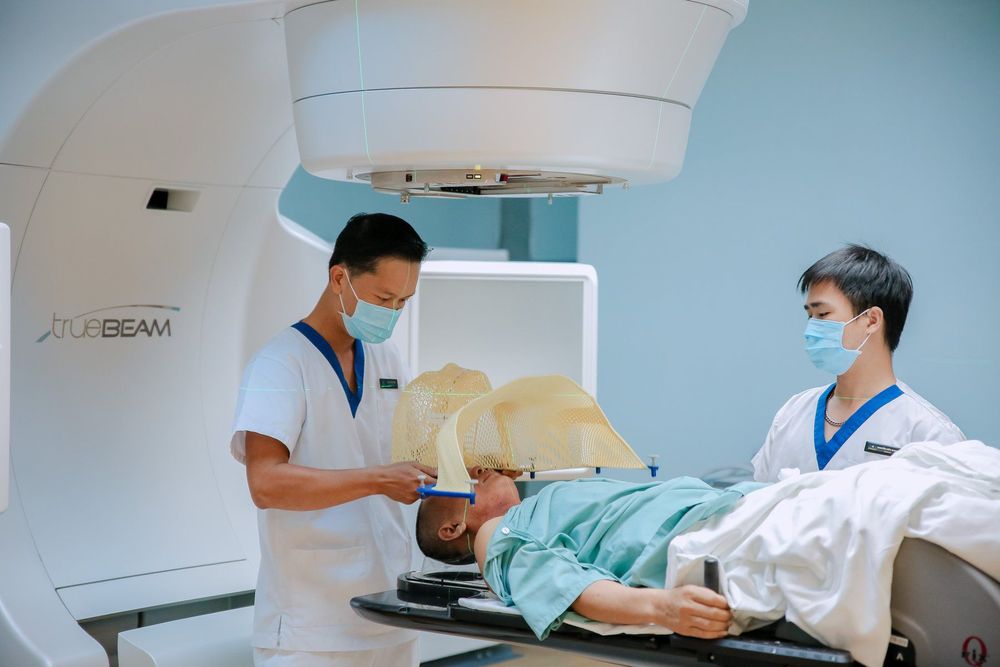This is an automatically translated article.
Articles written by MSc, BS. Nguyen Vinh Toan, Interdisciplinary Department - Vinmec Times City International General Hospital
Early detection of laryngeal cancer is very important, directly affecting the prognosis and effectiveness of treatment. So what is the early stage of laryngeal cancer? how to treat? This article will help you better understand these issues.
1. What is the larynx?
The larynx is a part of the respiratory tract, has a tubular shape, the upper connects to the pharynx, the bottom connects to the trachea, responsible for vocalization and air conduction. The larynx is located in the neck, in front of the pharynx.

Thanh quản có vai trò phát âm và dẫn khí
2. Symptoms of early stage laryngeal cancer
Voice change: Most patients with laryngeal cancer begin with voice changes, which are an important symptom, an early warning sign. Patients often complain of hoarseness. Many experts say that if you notice a change in your voice for about 3 weeks without any improvement, you should see your doctor for a checkup. Nodules in the neck: The patient can also feel a lymph node in the neck. This is a sign that cancer cells have spread into the lymphatic system in the neck area. Sore Throat: A persistent sore throat accompanied by signs such as a lump in the throat or having to cough a lot is also an early sign of laryngeal cancer and needs to be checked by a doctor. Shortness of breath: Many patients with laryngeal cancer have shortness of breath as the first symptom. Some patients present with wheezing, or wheezing. This symptom occurs when laryngeal cancer causes a significant narrowing of the patient's airway diameter. Difficulty swallowing: This symptom is uncommon, usually in the late stages of laryngeal cancer, when the tumor has invaded the oropharynx at the back. Rapid weight loss: Usually, rapid weight loss for no reason or no specific cause is found is a suspicious sign related to many cancers including laryngeal cancer.

Ung thư thanh quản khiến người bệnh sụt cân nhanh chóng
3. How is early stage laryngeal cancer treated?
The choice of treatment for laryngeal cancer in the early stages depends on many factors, such as the location, stage of the cancer, the type of cancer cells, the patient's general health and the desired treatment. patient treatment. Your doctor will discuss with you what treatment is best for you.
3.1 Radiation therapy
Radiation therapy is a method of using high-energy beams such as X-rays or protons to deliver energy to destroy cancer cells causing them to die. Most radiation therapy is delivered from a large machine located outside the body (called external irradiation) or can come from radioactive particles or wires placed inside the body, near the area where the cells are located. cancer cells (called internal irradiation). For early-stage cancers, radiation alone may be sufficient. For more widespread cancers, radiation therapy may be used only to relieve symptoms or shrink the tumor in preparation for other treatments.

Phương pháp xạ trị được áp dụng phổ biến trong điều trị ung thư thanh quản giai đoạn đầu
3.2 Surgery
Based on the characteristics and spread of the tumor, the doctor can choose one of the following treatment methods:
Early stage surgery: If the tumor is only in a small area of the larynx, or when the cancer is new, it may be time to just have laparoscopic surgery. Your doctor will insert an endoscope through your mouth into your larynx and then use surgical tools or lasers to cut out the tumor. Partial laryngectomy: As the tumor spreads, the doctor may have to remove the cancerous part of the larynx, but will try to preserve as much of the larynx as possible. This allows the patient to maintain speech and breathing. Total laryngectomy: When the tumor has spread very widely, then your doctor may have to recommend a total laryngectomy. You will then have to breathe through a hole in your neck that is open to your windpipe (permanent tracheostomy). If your larynx is completely removed, there are still methods to restore your voice including: electronic larynx, or abdominal voice training, ...
3.3 Chemicals
Chemicals are used to kill cancer cells. Chemotherapy is often used in combination with radiation therapy in the treatment of laryngeal cancer. Some chemicals make cancer cells more sensitive to radiation. However, the combination of radiation and chemotherapy always comes with increased side effects.

Phương pháp hóa chất thường được kết hợp với phương pháp xạ trị để điều trị bệnh
3.4 Targeted drugs
Targeted drugs are drugs that treat cancer by targeting specific defects that affect the division and growth of cancer cells. For example, Cetuximab is a targeted therapy drug used to treat oropharyngeal cancer. Cetuximab inhibits the activity of proteins found in many cancer cells. Currently, people are still studying the effectiveness and effects of targeted drugs.
To detect early stage laryngeal cancer, you should screen for cancer as soon as there are abnormal signs on the body. Vinmec International General Hospital currently has a high-tech cancer screening and examination package, including genetic testing, imaging, and biomarkers for early tumor detection. A single gene test can assess the risk of 16 common cancers in both men and women (laryngeal cancer, lung cancer, colorectal cancer, breast cancer, pancreatic cancer) , cervical cancer , stomach cancer , prostate cancer ,....)
Please dial HOTLINE for more information or register for an appointment HERE. Download MyVinmec app to make appointments faster and to manage your bookings easily.













